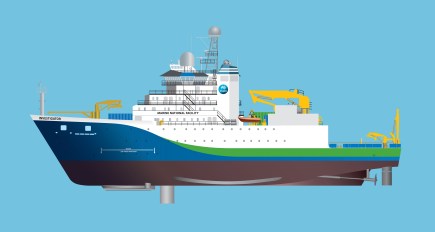This is what CSIRO’s future research vessel Investigator will look like.
Image: Future Research Vessel Project/CSIRO
About 70% of the world’s surface is covered by ocean. You don’t even need to live near the coast to be affected by the sea. The sea is an important source of food, its currents influence climate systems and a significant amount of the oxygen we breathe comes from phytoplankton in the ocean.
The ocean is particularly important to Australia. More than 80% of our population lives within 50 kilometres from the coast, places like the Great Barrier Reef are important tourist destinations and the beach continues to be a central part of Australian identity and culture.
This means that marine research and understanding the ocean are of great significance to both Australia and the world. For example, marine research helps scientists to understand complex phenomena such as climate change and geological processes, and how to manage marine resources sustainably. To do this, scientists need ships.
Ships have played an important role in science and discovery for centuries. Darwin’s voyage on the Beagle influenced his theories of evolution, Cook explored the east coast of Australia after observing a transit of Venus and Polynesian peoples used simple wooden boats to colonise Pacific Islands.
The Marine National Facility’s new research vessel, Investigator, is currently under construction. Investigator will be operated by CSIRO, and will be available to Australian marine scientists to conduct research and observations. The ship will be almost 94 metres long, and will replace Southern Surveyor, which is 40 years old.
Investigator will have a specially designed hull to minimise interference with the ship’s underwater sensors and instruments. It will also be fitted with an underwater camera and the latest marine scientific equipment that can map the sea floor, find out how many fish there are in certain places and collect seafloor samples down to 6,000 metres.
One of the new areas of research that will be possible on the Investigator is advanced atmospheric science. This is important for us to understand things like the weather, air pollution and climate change.
Like its predecessor, Investigator will enable the collection of data on marine ecology, geology and climatology, and continue a long tradition of ships sailing for science.
If you’re after more science news for kids, subscribe to Double Helix magazine!









Leave a Reply